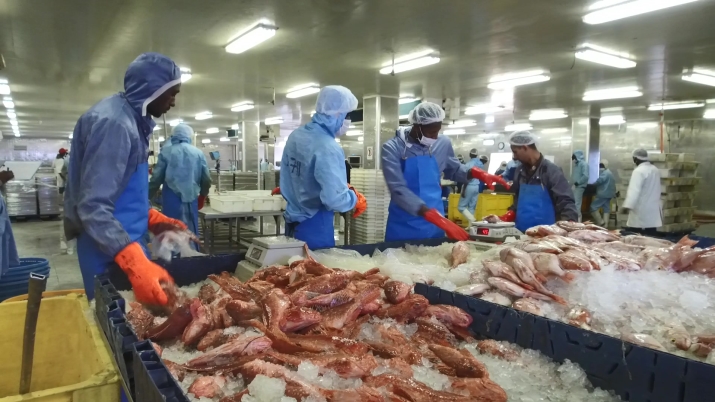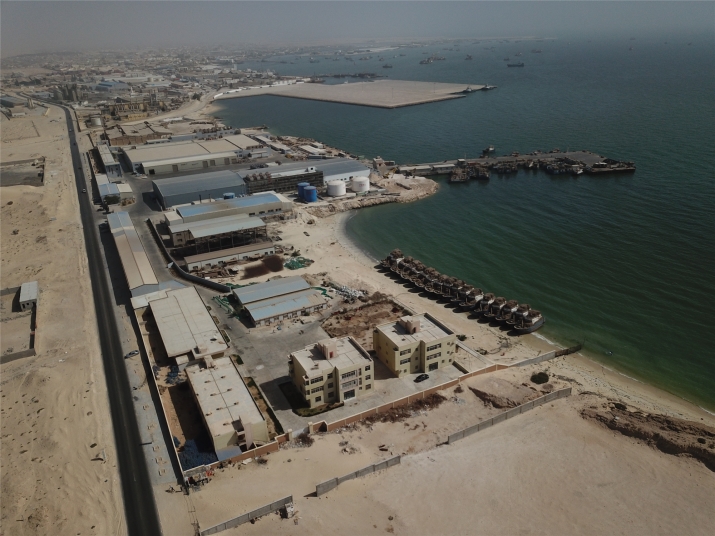|
||||||||||
| Home Nation World Business Opinion Lifestyle ChinAfrica Multimedia Columnists Documents Special Reports |
|
||||||||||
| Home Nation World Business Opinion Lifestyle ChinAfrica Multimedia Columnists Documents Special Reports |
| ChinAfrica |
| Ocean Basket |
| A Chinese company's investments in Mauritania's fishing industry promotes better use of local sea resources |
| By Ge Lijun | VOL.11 May ·2019-05-10 |

Local employees process fish products
Hindou Mint Khartoun is inspired and motivated. Since June 2012, the 26-year-old woman has been working in the logistics department of a fishing company in Mauritania's coastal Nouadhibou. She is now working as the communication officer for her company and is able to identify, categorize and package fish.
"Should my parents need money, I am now able to help them," she said proudly, adding that her salary even enabled her to open her own store, which she manages after work.
Khartoun's career development is one of the many ways in which Hongdong Fishery's investments have made a positive impact in Mauritania. Hongdong Fishery was headquartered in Fuzhou, southeast China's Fujian Province, which is the focal point of China's offshore fishing industry. Despite its humble beginnings with only two fishing boats, the company has gradually expanded and grown into a large-scale deep-sea fishing company with a complete industrial chain integrating fishing, cold chain logistics and seafood processing.
However, during its rapid growth, the company also faced bottlenecks, such as high costs of ocean transport and difficulties in finding supplies abroad. In 2010, Hongdong made a major decision to invest in Africa and chose Mauritania as its base. Indeed, the West African country has plenty of high-quality fishery resources, but lacks the expertise and know-how needed to tap its huge potential, which Hongdong could provide. On the basis of this strong complementarity, the Mauritanian Government and Hongdong signed a 50-year cooperation agreement.
"The launch of the Belt and Road Initiative in 2013 has strengthened our confidence in international operations. We have come up with a new development model, which promotes local economic development as well as the long-term development of our company," Lan Pingyong, Chairman of Hongdong Fishery's Board of Directors, told ChinAfrica.
Localization model
Since 2012, the company has been cooperating with China Export and Credit Insurance Corp., which allowed it to secure financing from the major Chinese banks. Thanks to this financial backing, Hongdong has invested nearly $100 million to build a modern fishing base in Nouadhibou. The base includes a wharf, a cold room, a processing plant, a training center and staff housing covering an area of 90,000 square meters.
Mauritania attaches great importance to the protection of its fishery resources. The country has adopted strict regulations for this industry, and conducts inspections of vessels and fishery products on a regular basis. "The strict regulatory oversight gave us the assurance of the long-term development potential of the country's fishing industry. So we decided to localize our business activities in order to better promote local fishing," Chen Zhongjie, General Manager of Hongdong Fishery, told ChinAfrica.
The Mauritanian Government welcomed the company's plans with open arms, and quickly issued licenses for its 169 fishing vessels. The company used advanced methods to catch different fish species authorized for fishing in Mauritania, including both pelagic (fish that live neither close to the bottom nor near the shore) and deep-sea species. Currently the company's fishing volume is 60,000 tons per year. Based on its success, last year, Hongdong decided to invest 400 million yuan ($59.7 million) to expand its fishing base in Mauritania, which will have a capacity of processing 100,000 tons of pelagic fish per year. Once collected, the sea products are processed and frozen in a local factory and then shipped for sale in Europe, Japan and China, as well as elsewhere on the African continent. No part of the fish is wasted: Fish heads and tails are also used for making livestock fish meal and producing fish oil. "We do not throw anything away, because that would cause too much waste. We do not waste any fish," said Lan.
"In Mauritania, Hongdong is developing the means to use all kinds of sea fish resources, making it possible to utilize resources in a more balanced and reasonable way," said Nani Ould Chrougha, former Minister of Fisheries and Maritime Economy of Mauritania.

Hongdong Fishery in Mauritania
Higher skill development
In addition to creating local jobs and generating tax revenues, the Chinese company has brought to Mauritania modern technologies related to fishing, processing and cold chain transportation, raising the level of the local fishing industry.
"In fact, it is a win-win process," Lan said. According to him, nearly 2,000 local people now work at Hongdong Fishery in Nouadhibou, accounting for more than 70 percent of the total workers. When the expansion project will be completed by the end of this year, 1,000 jobs will be added. This is significant, considering that Nouadhibou has a population of less than 100,000.
Moreover, many people are employed in the fish trade with neighboring Mali, just a few km from Nouadhibou. The company has also built schools, housing and sports facilities in the local community, and even provides transportation for employees. In addition, employees receive training on skills related to fish identification, fishing and processing. Thanks to these efforts, hundreds of local technical specialists have been trained in the last few years.
Dekouma Med Yesslem, 27, is one of them. He joined Hongdong in 2013. For the last four years, he has been working in the import-export department, where he is in charge of supervising the loading of fish containers. "I have learned a lot and I am quite happy with my job, because I can buy goods for my family and raise my children using my own salary," he said.
In addition, in order to further promote the development of the local fishing industry, 100 fishing boats have been specially provided by Hongdong to teach fishermen how to sail and fish.
"As of today, many people in the region have acquired skills and experience, and some want to buy a boat to start their own fishing businesses," said Chen, adding that Hongdong paid about $2.5 million in tax revenue to the Mauritanian Government last year alone. Based on this growing fishing base, an industrial chain centered on fisheries has taken shape in Mauritania, including diverse activities such as ship repair, fuel supply, net repair and seafood processing.
"The investment made by Hongdong in our country has brought several benefits to the local population. Unlike other companies that simply fish, Hongdong is also involved in fish processing, which has helped fuel the development of Nouadhibou's economy," said Mohamed Ould Daf, former President of the Nouadhibou Free Trade Area.
With its rich experience in Nouadhibou, Hongdong is now seeking to replicate this model in other African countries, such as Guinea and São Tomé and Príncipe.
"We are both active participants and beneficiaries of the Belt and Road Initiative. I am very proud when I see nearly 2,000 Mauritanian employees working in the Hongdong fishing base, many of whom have also learned Chinese and have been promoted to managerial positions," said Lan.
(Comments to glj@chinafrica.cn)
| About Us | Contact Us | Advertise with Us | Subscribe |
| Copyright Beijing Review All rights reserved 京ICP备08005356号-5 京公网安备110102005860号 |